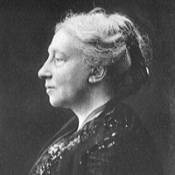Lady Augusta Gregory
Playwright
Biography
Lady Augusta Gregory
Lady Augusta Gregory (born Isabella Augusta Persse) was an Irish dramatist and theatre manager. She played a key role in the establishment of Dublin’s Abbey Theatre and contributed to the Irish Literary Revival of the early twentieth century.
Born in County Galway, Lady Gregory was introduced to local folklore and legends by her nanny as a child. She married Sir William Henry Gregory and the couple held weekly literary salons at their second home in London. Following his death in 1892, Lady Gregory edited and published her husband’s autobiography, followed by a collection of correspondence written during the early nineteenth century. Her historical research led to her becoming a more vocal supporter of Irish Nationalism and Republicanism.
Lady Gregory's estate at Coole Park became a gathering place for the most prominent figures of the Irish Literary revival, including John Millington Synge, George Bernard Shaw, and (a little later) Sean O'Casey. Along with playwright Edward Martyn and poet W.B. Yeats, Lady Gregory co-founded the Irish Literary Theatre in 1899. When it collapsed in 1901 due to lack of funding, Lady Gregory was once again instrumental in founding the Irish National Theatre Society (subsequently known as the Abbey Theatre) in 1904. The theatre was devoted to producing homegrown plays by Irish playwrights. One of her own plays, Spreading the News was performed at the theatre's inaugural performance. Over the course of her career, she wrote over 19 plays, most of which were performed at the Abbey Theatre. She tended to write in a transliteration of the Hiberno-English dialect, which was spoken throughout Galway. She also wrote a number of books retelling stories from Irish folklore.
Lady Gregory died at the age of 80 from breast cancer. Although her plays fell out of favor, her legacy as an influential figure in the Irish Literary Revival lives on. George Bernard Shaw once described as “the greatest living Irishwoman” and her published diaries and journals provide an important insight into the Irish literary scene at the beginning of the twentieth century.
Shows
Shows associated with Lady Augusta Gregory
Monologues
Monologues from shows associated with Lady Augusta Gregory
Scenes
Scenes from shows associated with Lady Augusta Gregory
Videos
Videos associated with Lady Augusta Gregory
Quizzes
Quizzes associated with Lady Augusta Gregory
Learning Modules
Learning modules associated with Lady Augusta Gregory
Additional Information
N/A
